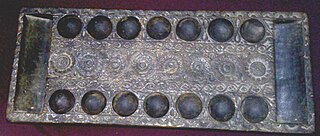 W
WAli Guli Mane is an abstract strategy board game of the mancala family, from Karnataka in South India. It is known as Chenne Mane in Tulunaadu Akal Patta in North Karnataka. The name of the game, like that of many mancala games across the world, is simply a description of the board used: it means a "wooden block with holes". It is similar to Pallanguzhi from the neighbouring state of Tamil Nadu. There are also similarities with the traditional Malay mancala game Congkak.
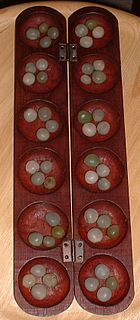 W
WAyoayo is a traditional mancala played by the Yoruba people in Nigeria. It is very close to the Oware game that spread to the Americas with the atlantic slave trade. Among modern mancalas, which are most often derived from Warri, the Kalah is a notable one that has essentially the same rules as Ayoayo.
 W
WBao is a traditional mancala board game played in most of East Africa including Kenya, Tanzania, Comoros, Malawi, as well as some areas of DR Congo and Burundi. It is most popular among the Swahili people of Tanzania and Kenya; the name itself "Bao" is the Swahili word for "board" or "board game". In Tanzania, and especially Zanzibar, a "bao master" is held in high respect. In Malawi, a close variant of the game is known as Bawo, which is the Yao equivalent of the Swahili name.
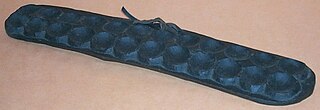 W
WEndodoi is a traditional mancala game played by the Maasai people of Kenya and Tanzania. It is very close to the Ayoayo game of the Yoruba people of Nigeria, although there is no evidence of a direct relationship between the two. Maasai are known to play Endodoi very quickly, to the point that an external observer may find it hard to even distinguish individual moves and turns.
 W
WEnkeshui is a traditional mancala game played by the Maasai of both Kenya and Tanzania. It is a rather complex mancala game, and bears some similarities to the Layli Goobalay mancala played in Somaliland.
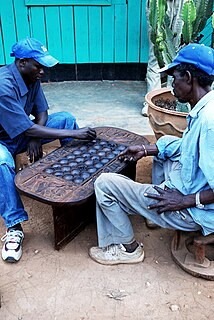 W
WIgisoro is a two-player game of the mancala family. It is a variant of the Omweso game of the Baganda people (Uganda), and it is played primarily in Burundi and Rwanda. Igisoro, like Omweso and other mancalas from Eastern Africa such as Bao, is played with a 4×8 board of pits and 64 seeds. A player's territory is the two rows of pits closest to them.
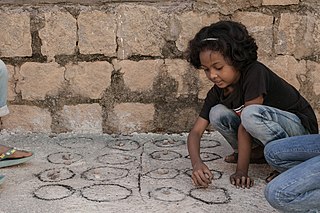 W
WKatro is a traditional mancala game played by the Betsileo people in the Fianarantsoa Province of Madagascar. The game was first described by Alex de Voogt in 1998.
 W
WLayli Goobalay is a board game played in parts of Somalia. It is a variant of the classical count and capture game mancala, which is one of the oldest two-player strategy board games played throughout the world. Layli Goobalay means "to exercise with circles" in the Somali language.
 W
WMangala is a traditional Turkish mancala game. It is strictly related to the mancala games Iraqi Halusa, Palestinian Al-manqala, and Baltic German Bohnenspiel. There is also another game referred as Mangala played by the Bedouin in Egypt, and Sudan, but it has quite different rules.
 W
WÔ ăn quan is a traditional Vietnamese children's board game. This game is valuable for enhancing calculating and strategical ability.
 W
WOmweso is the traditional mancala game of the Ugandan people. The game was supposedly introduced by the Bachwezi people of the ancient Bunyoro-kitara empire of Uganda. Nowadays the game is dominated by Ugandan villagers. It is a very hard and fast game said to keep one's mind high and ever excited, which can make it addictive. The equipment needed for the game is essentially the same as that of the Bao game. Omweso is strictly related to a wide family of mancalas found in eastern and southern Africa; these include Coro in the Lango region of Uganda, Aweet in Sudan, [] in Namibia, Kombe in Lamu (Kenya), Mongale in Mombasa (Kenya), Mongola in Congo, Igisoro in Rwanda, and Kiela in Angola.
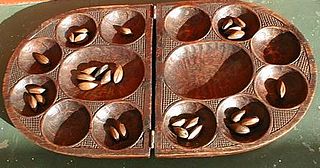 W
WOware is an abstract strategy game among the Mancala family of board games played worldwide with slight variations as to the layout of the game, number of players and strategy of play. Its origin is uncertain but it is widely believed to be of Ashanti origin.
 W
WPallanghuzi, or Pallankuli, is a traditional ancient mancala game played in South India especially Tamil Nadu and Kerala. Later the games were spread to other places including Karnataka and Andhra Pradesh in India as well as, Sri Lanka and Malaysia. Variants are called as Ali guli mane, Vamana guntalu, and Kuzhipara. The game is played by two players, with a wooden board that has fourteen pits in all (hence the name from the words fourteen pits. There have been several variations in the layout of the pits, one among them being seven pits on each player's side. The pits contain cowry shells, seeds or small pebbles used as counters. There are several variations of the game depending on the number of shells each player starts with.
 W
WSoutheast Asian mancalas are a subtype of mancala games predominantly found in Southeast Asia. They are known as congka or congklak in Indonesia, congkak in Malaysia and Brunei, and sungkâ in the Philippines. They differ from other mancala games in that the player's store is included in the placing of the seeds. Like other mancalas, they vary widely in terms of the rules and number of holes used.
 W
WToguz korgool or toguz kumalak, is a two-player game in the mancala family that is played in Central Asia.